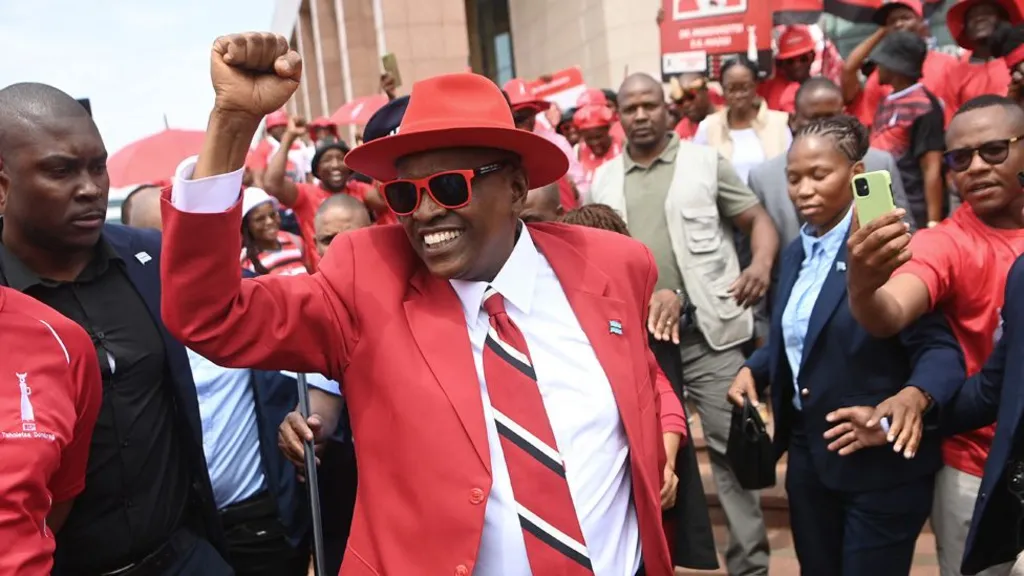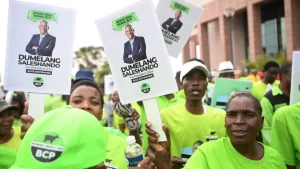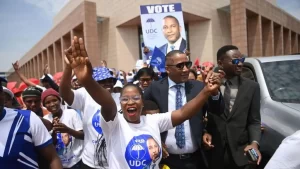Botswana’s Longstanding Ruling Party Seeks Change Ahead of Elections
4 min read
Botswana’s ruling party, the Botswana Democratic Party (BDP), is attempting to reinvent itself ahead of Wednesday’s general election, despite being in power for nearly 60 years. In a surprising twist, the BDP has adopted a slogan typically associated with opposition groups, calling for “change” in its election manifesto.
“Let’s change together and build prosperity for all,” writes President Mokgweetsi Masisi, who has led the country since 2018. This shift acknowledges widespread sentiment that the current administration must adapt to evolving challenges, a perspective strongly emphasized by opposition parties.
Historically, the BDP has dominated Botswana’s political landscape, winning parliamentary majorities in all 11 elections since the country’s independence in 1966. Each time, the party has also secured the presidency, as Members of Parliament elect the head of state. The BDP is often credited with transforming Botswana from a struggling nation with minimal infrastructure into a country with some of the highest living standards in Africa, largely due to its vast diamond resources.
Despite these achievements, economic difficulties loom large. More than 25% of the workforce is unemployed, with even higher rates among young people, according to World Bank data. Zibani Maundeni, a political science professor at the University of Botswana, describes the situation as a “jobless economy.” He emphasizes that while the nation produces a significant number of graduates annually, the economy cannot provide enough jobs to accommodate them. Furthermore, wealth distribution remains highly unequal, with Botswana ranking as one of the most unequal nations globally according to the Gini index.

Compounding these issues, the global demand for diamonds appears to be declining, putting additional pressure on an industry that has long underpinned Botswana’s economy. Nevertheless, President Masisi and the BDP project confidence. At a recent rally in a known opposition stronghold, the president arrived in an electric vehicle produced locally, engaging the crowd with his humor and charisma.
The rally took place in an area that previously elected three opposition MPs in 2019, after former President Ian Khama left the BDP to help form the Botswana Patriotic Front (BPF). Khama has publicly criticized Masisi, alleging attempts on his life, which led to his departure from the country and subsequent criminal charges, all of which he denies.
During the rally, Masisi appealed to voters: “I am sorry, please come back home and also call others over.” Some attendees, like hair salon owner Thandiwe Potso, expressed optimism, stating that Masisi understands their challenges and has initiated better funding programs for businesses.
However, an opinion poll conducted by the non-partisan organization Afrobarometer reveals a more skeptical view of the government. The report indicates that, despite Botswana’s high ranking in good governance, many citizens harbor doubts about the administration, citing high levels of perceived corruption and a general lack of trust in the president.
BDP spokesperson Kagelelo Banks Kentse dismissed the poll’s findings, arguing that Afrobarometer has previously underestimated support for the party. He acknowledged the challenges posed by unemployment but argued that similar issues affect countries across Africa. Kentse emphasized the party’s commitment to creating 300,000 new jobs and highlighted a recent deal with diamond firm De Beers, which would increase Botswana’s share of diamond revenues.

In contrast, Dumelang Saleshando, leader of the opposition Botswana Congress Party (BCP), accused the BDP of merely replicating others’ ideas. He questioned the sincerity of the BDP’s call for change, noting that it has historically framed itself as a stabilizing force rather than an agent of transformation. Saleshando’s campaign slogan, “Save Botswana,” underscores a growing discontent among voters.
Supporters of the Umbrella for Democratic Change (UDC), another major opposition party, rallied in Gaborone, where leader Duma Boko highlighted the suffering of the populace under BDP governance. He urged voters to remain vigilant to ensure the integrity of the election.
Former teacher Thapelo Dimpe articulated his disillusionment with Masisi’s administration, particularly regarding education reform, asserting that the UDC plans to invest significantly in education to empower the youth.
While the BDP faces several internal and external challenges, opposition disunity may provide an advantage. The first-past-the-post voting system allows the BDP to win seats with a plurality rather than a majority, which could work in its favor if the opposition vote is split among several parties.
Political analyst Lesole Machacha noted that while the BDP is grappling with its own issues, including disgruntled politicians running as independents, it remains a significant contender. With an unpredictable election on the horizon, the BDP’s ability to convince voters that it can effect real change is now at stake.






